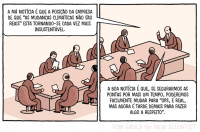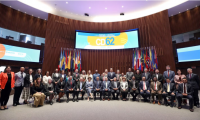Experts debate challenges to the access to biological medicines
 “The access to medicines is not a problem of developing countries only, but of the whole world. It is a battle of trade versus health". The declaration of the Vice President for Production and Innovation at Fiocruz and member of the United Nations High-Level Panel on Access to Medicines, Jorge Bermudez, gives the gist of the two days of debates in the meeting "Strategies to improve the access to biological products: lessons learned and challenges”, which ended last Thursday (9) at ISAGS’ headquarters.
“The access to medicines is not a problem of developing countries only, but of the whole world. It is a battle of trade versus health". The declaration of the Vice President for Production and Innovation at Fiocruz and member of the United Nations High-Level Panel on Access to Medicines, Jorge Bermudez, gives the gist of the two days of debates in the meeting "Strategies to improve the access to biological products: lessons learned and challenges”, which ended last Thursday (9) at ISAGS’ headquarters.
The event was coordinated by the technical advisor on Economy, Policy and Regulation in Health, Monica Sutton, and was attended by representatives from the Ministries of Health of eight member countries of UNASUR, as well as lecturers from the whole region, such as Carlos Correa. Researcher at the South Centre in Geneva (Switzerland), he addressed the challenge of dealing with patents and avoiding the increase in prices of biological medicines in South America and in the world. According to Correa, even though the problem is generally associated with high costs of research and development, "the majority of products is discovered by public and not private laboratories". “We don‘t have concrete data about the costs for the development of these products, only estimations", he explained.
This was also pointed out by Felipe Carvalho, from Doctors Without Borders (MSF), who highlighted that, when there was a request for more transparency so as to understand such costs, the companies changed their arguments and started to say that high prices were justifiable by the value of these products. “This results in exclusion, for those who do not represent a significant market end up without access to the medicines or vaccines they need.”
Carlos Gadelha, researcher at Fiocruz, also attended the meeting and reinforced the importance of addressing the issue of medicines in a systemic way. According to the expert, we cannot deal solely with the product, without addressing its impact on the legitimate interests of the health systems. “From the health perspective, we can build a powerful narrative that includes actors from the fields of economy and intellectual property. The structural agenda is not only a utopian agenda”, he added.
By the same token, Jorge Bermudez acknowledged that integrated and consensual actions through blocs, such as UNASUR, are considered strengths. Likewise, ISAGS’ future executive director, Carina Vance, highlighted the role of the Institute in this collaboration process. “The industry‘s creative perverse strategies should inspire us to also adopt creative ‘perverse’ strategies. Although conjoint procurement is not a structural solution, it is an opportunity to address structural questions. By gathering, we are able to debate better practices and strategies”, emphasized the former Minister of Ecuador.
Besides the lectures, the countries presented their experiences regarding the improvement of the access to biological products. The information was used during group activities, which aimed to identify challenges and opportunities based on a work methodology elaborated by ISAGS.
“This meeting will produce a report with the conclusions and collaborations made by participants, and it will be put forward to ministers and national coordinators. We have many tools to put pressure on issues we want to”, concluded Monica Sutton.



